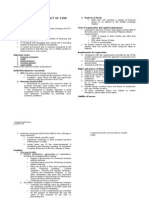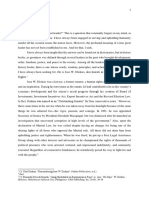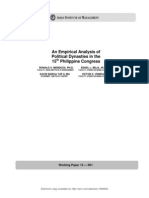Political Dynasty in The Philippines
Political Dynasty in The Philippines
Uploaded by
Kevin Karl PobreCopyright:
Available Formats
Political Dynasty in The Philippines
Political Dynasty in The Philippines
Uploaded by
Kevin Karl PobreOriginal Title
Copyright
Available Formats
Share this document
Did you find this document useful?
Is this content inappropriate?
Copyright:
Available Formats
Political Dynasty in The Philippines
Political Dynasty in The Philippines
Uploaded by
Kevin Karl PobreCopyright:
Available Formats
Political Dynasty in the Philippines Political Dynasties as transpired in the discussion that has been made by the speakers
pertains to a succession of rulers from the same family or line. According to the speakers this definition is been garnered to the website www.thefreedictionary.com. Under Philippine laws, however, there is no definition of what a political dynasty is. Yes, political dynasty is prohibited under our Constitution, but there is still no law that implements this provision, an enabling law supposed to be enacted by Congress. Article II, Section 26 imposes upon the state the obligation of guaranteeing equal access to public office, but left the task of defining political dynasty at the hands of Congress. History now tells us that Congress has fared really bad on this task. Many have called for the Congress to pass the Anti-Dynasty Law, but this bill has been passed over by each Congress since 1987. Some have pointed that oligarchy is the root problem of all the corruption in the Philippine government. The advantages of having political dynasty in the Philippines is that leaders with relatively longer in tenure in office or expected to be in office for a longer period will have the incentive to develop their respective jurisdiction as they foresee the future benefits it will reap for them. On the other hand, leaders who resemble the behaviour of Roving Bandits do not have the incentive to perform well in office or to invest for the future since they will leave the position soon enough. In this manner, political dynasties can be likened to the Stationary Bandits where it has an incentive to encourage a degree of economic success, since he will expect to be in power long enough to take a share of it.
Enshrine
You might also like
- Fee Schedule Copy Add Trust Then Scribe ItDocument9 pagesFee Schedule Copy Add Trust Then Scribe ItLouis Joe100% (5)
- KAPARIZ ByLaws2020Document8 pagesKAPARIZ ByLaws2020Ruby Ann FrialNo ratings yet
- Certificate of Live BirthDocument2 pagesCertificate of Live BirthMarvey Castillo100% (1)
- Metro Broadcasting Inc V FCC - Regrouping in Singular Times, Patricia J. WilliamsDocument16 pagesMetro Broadcasting Inc V FCC - Regrouping in Singular Times, Patricia J. WilliamsHJayBee30No ratings yet
- What Is Wrong With Political DynastiesDocument4 pagesWhat Is Wrong With Political DynastiesMichael LagundiNo ratings yet
- Local Political DynastyDocument2 pagesLocal Political DynastyJoel Encaguez AsuncionNo ratings yet
- Law On Negotiable Instruments Atty. Deonnalynne Fernandez: Promise or Order To Pay A Sum Certain in Money? (25 PTS)Document1 pageLaw On Negotiable Instruments Atty. Deonnalynne Fernandez: Promise or Order To Pay A Sum Certain in Money? (25 PTS)SheenNo ratings yet
- The Implication of Political Dynasty Towards Governance in Inabanga Final 1Document27 pagesThe Implication of Political Dynasty Towards Governance in Inabanga Final 1Gerard JaposNo ratings yet
- Political Dynasty in The PhilippinesDocument12 pagesPolitical Dynasty in The PhilippinesMelvin Ariel Bautista100% (1)
- Legal Ethics Full Text Cases For 2011Document78 pagesLegal Ethics Full Text Cases For 2011Alma Marie Servito-CablesNo ratings yet
- Bar Q and A Political LawDocument36 pagesBar Q and A Political LawCatherine GayasoNo ratings yet
- Which Issues in Heneral Luna Do You Still See in Today's Philippine Politics?Document5 pagesWhich Issues in Heneral Luna Do You Still See in Today's Philippine Politics?Aziel PalattaoNo ratings yet
- Batas Kasambahay Between The Rhetorical and Realistic Voice of The StateDocument16 pagesBatas Kasambahay Between The Rhetorical and Realistic Voice of The StatesirrhougeNo ratings yet
- Compiled Cases For PATDocument20 pagesCompiled Cases For PATkingley leanderNo ratings yet
- Financing Company Act of 1998Document2 pagesFinancing Company Act of 1998Rhé Ramos0% (1)
- Influence of Political DynastiesDocument27 pagesInfluence of Political DynastiesJanMikhailPanerioNo ratings yet
- Legal ApproachDocument4 pagesLegal ApproachEmmanuel Jimenez-Bacud, CSE-Professional,BA-MA Pol SciNo ratings yet
- Anti-Political Dynasty BillDocument5 pagesAnti-Political Dynasty BillFrancis Rio PacularesNo ratings yet
- Conventional RedemptionDocument3 pagesConventional RedemptionIRENE PALUMBARETNo ratings yet
- Torres Vs CADocument2 pagesTorres Vs CALorelieNo ratings yet
- Harmonizing and Reconciling Drug and AIDS LawDocument37 pagesHarmonizing and Reconciling Drug and AIDS LawAna Portia BanalNo ratings yet
- 1f Nature and Effects of Obligations by DeleonDocument17 pages1f Nature and Effects of Obligations by DeleonFerry FrondaNo ratings yet
- 10 - Leny Villareal - 2 Legal Framework For GI Protection in TheDocument28 pages10 - Leny Villareal - 2 Legal Framework For GI Protection in TheBrunxAlabastroNo ratings yet
- POLGOV Book 1Document26 pagesPOLGOV Book 1Dana MichelleNo ratings yet
- Preface: Lera May B. Caspe, RN, MNDocument37 pagesPreface: Lera May B. Caspe, RN, MNLera Blanco CaspeNo ratings yet
- Bantay KorapsyonDocument20 pagesBantay KorapsyonAirah GolingayNo ratings yet
- LTD1Document17 pagesLTD1cheryanNo ratings yet
- Chin Vs LandbankDocument6 pagesChin Vs LandbankLegaspiCabatchaNo ratings yet
- Civ Pro CasesDocument15 pagesCiv Pro CasesNelsonPolinarLaurdenNo ratings yet
- Article7 Executive DepartmentDocument18 pagesArticle7 Executive DepartmentJoshua PErez GuillanoNo ratings yet
- Negotiable InstrumentDocument67 pagesNegotiable InstrumentZenon PalomaNo ratings yet
- The Panti SistersDocument3 pagesThe Panti SistersJen DeeNo ratings yet
- Probation Law of 1976Document3 pagesProbation Law of 1976Roland MarananNo ratings yet
- Chapter 4 Qualifications and DisqualificationsDocument46 pagesChapter 4 Qualifications and DisqualificationsJoulo YabutNo ratings yet
- Taxation: General PrinciplesDocument34 pagesTaxation: General PrinciplesKeziah A GicainNo ratings yet
- Negotiable Instruments Act 1881Document40 pagesNegotiable Instruments Act 1881Knt Nallasamy Gounder100% (1)
- Reflection On Election 2022Document1 pageReflection On Election 2022CrisJane Erica PerezNo ratings yet
- Art 1489 1492 Case DigestsDocument5 pagesArt 1489 1492 Case DigestsMartinNo ratings yet
- Republic Act No 8424Document206 pagesRepublic Act No 8424YanoNo ratings yet
- Leadership Style of Raul RocoDocument25 pagesLeadership Style of Raul RocoRadee King CorpuzNo ratings yet
- Notes On Globalization A Basic Text (Ritzer 2015)Document5 pagesNotes On Globalization A Basic Text (Ritzer 2015)Demonise BloodNo ratings yet
- Sec 1 - 23 Self Made ReviewerDocument21 pagesSec 1 - 23 Self Made ReviewerJyasmine Aura V. AgustinNo ratings yet
- Maggie Dela RivaDocument3 pagesMaggie Dela RivaTrishalyVienBaslotNo ratings yet
- Creation, Conversion, Division, Merger and Consolidation and Abolition of LgusDocument6 pagesCreation, Conversion, Division, Merger and Consolidation and Abolition of LgusjeffdelacruzNo ratings yet
- The Bill of Rights of FilipinosDocument3 pagesThe Bill of Rights of FilipinosPornillosa, Jenaehl Mikhail S.No ratings yet
- Commercial Law ReviewerDocument50 pagesCommercial Law ReviewerAmer Hassan Guiling GuroNo ratings yet
- Javellana V DILGDocument10 pagesJavellana V DILGClarence RevadilloNo ratings yet
- 1 Meritt Vs Gov't of The PhilDocument1 page1 Meritt Vs Gov't of The PhilChickoy RamirezNo ratings yet
- Faith NarrativeDocument6 pagesFaith NarrativeShannen Pondoc100% (1)
- An Empirical Analysis of Political Dynasties in The 15th Philippine Congress - Asian Institute of ManagementDocument41 pagesAn Empirical Analysis of Political Dynasties in The 15th Philippine Congress - Asian Institute of ManagementTano Dolores100% (4)
- October2016 SCRAindexDocument8 pagesOctober2016 SCRAindexArthur Kenneth lavapizNo ratings yet
- REPUBLIC ACT No 10152Document5 pagesREPUBLIC ACT No 10152dteroseNo ratings yet
- Renunciation of War.: TransformationDocument10 pagesRenunciation of War.: TransformationAngela De LeonNo ratings yet
- Quiz No. 1 - PrelimDocument6 pagesQuiz No. 1 - Prelimstar lightNo ratings yet
- (Puboff) (Oct 16)Document30 pages(Puboff) (Oct 16)HomerNo ratings yet
- System Government IndonesiaDocument8 pagesSystem Government IndonesiaYunike NurjannahNo ratings yet
- Nil Syllabus 2022Document3 pagesNil Syllabus 2022Angelica MaquiNo ratings yet
- Duty To Bargain - ReportDocument10 pagesDuty To Bargain - ReportMc BagualNo ratings yet
- Mix Digest and Full Cases in Legat EthicsDocument77 pagesMix Digest and Full Cases in Legat EthicsVina LangidenNo ratings yet
- Cobalt Resources Inc. v. AguadoDocument9 pagesCobalt Resources Inc. v. AguadoTris LeeNo ratings yet
- PIL Prefi TranscriptDocument28 pagesPIL Prefi TranscriptDennis Aran Tupaz AbrilNo ratings yet
- EnrichmentActivityM10 (Arpan)Document1 pageEnrichmentActivityM10 (Arpan)Christin Me LocsinNo ratings yet
- Political DynastyDocument3 pagesPolitical DynastyBoyong HachasoNo ratings yet
- Bogra Formula 1954Document3 pagesBogra Formula 1954Shamshad Ali Rahoojo75% (4)
- G.R. No. L-47731Document3 pagesG.R. No. L-47731Czyra F. CamayaNo ratings yet
- Al-Lami Mustafa Ali Rebat Al Basrah Iraq Iraqi: Application For National VisaDocument3 pagesAl-Lami Mustafa Ali Rebat Al Basrah Iraq Iraqi: Application For National Visaمصطفى عليNo ratings yet
- Statement of Claim SampleDocument3 pagesStatement of Claim SampleSI LI YEE0% (1)
- Motion For PostponementDocument3 pagesMotion For PostponementArnold Benedel T. MADERAJENo ratings yet
- The Political System of the USDocument44 pagesThe Political System of the USwissalbelloNo ratings yet
- Fernandez v. Dela Rosa, G.R No. 413 (1903)Document2 pagesFernandez v. Dela Rosa, G.R No. 413 (1903)Rianne SantosNo ratings yet
- Lim Vs LaguioDocument11 pagesLim Vs LaguioJune Steve BarredoNo ratings yet
- Worksheet - Nationalism in IndiaDocument6 pagesWorksheet - Nationalism in India07-ikshit ShajileshNo ratings yet
- Resume - John Michael C. LequiganDocument1 pageResume - John Michael C. LequiganJohn Michael LequiganNo ratings yet
- Assignment 7 - Civil Liberties and Civil RightsDocument4 pagesAssignment 7 - Civil Liberties and Civil RightsLuciana PenaNo ratings yet
- KSA 58-4301 Findings & Conclusions (7-2005)Document2 pagesKSA 58-4301 Findings & Conclusions (7-2005)Jana JaneckovaNo ratings yet
- Bizzare Laws in North KoreaDocument9 pagesBizzare Laws in North Korealalitha muraliNo ratings yet
- Online Exam Succession 3B - September 12 2020Document5 pagesOnline Exam Succession 3B - September 12 2020Joyce Amara VosotrosNo ratings yet
- I 765 PDFDocument7 pagesI 765 PDFJessie Yu-Ju ChiuNo ratings yet
- The Federalist/TIPP Pennsylvania Poll Sept. 24-26 2020Document126 pagesThe Federalist/TIPP Pennsylvania Poll Sept. 24-26 2020The Federalist100% (1)
- Links:: PART I. Baste ReviewerDocument15 pagesLinks:: PART I. Baste ReviewerJappy AlonNo ratings yet
- Analysis of Alternative Dispute Resolution inDocument21 pagesAnalysis of Alternative Dispute Resolution insabar6932019No ratings yet
- MachadoDocument5 pagesMachadoMarielNo ratings yet
- DOTr vs. Philippine Petroleum Sea, G.R. No. 230107 (2018Document23 pagesDOTr vs. Philippine Petroleum Sea, G.R. No. 230107 (2018Aaron James PuasoNo ratings yet
- City of Manila, Petitioner, vs. Genaro N. Teotico and Court of Appeals G.R. No. L-23052 January 29, 1968Document2 pagesCity of Manila, Petitioner, vs. Genaro N. Teotico and Court of Appeals G.R. No. L-23052 January 29, 1968Thammy DizonNo ratings yet
- Indigenous Voice Co-Design Process: Final Report To The Australian GovernmentDocument272 pagesIndigenous Voice Co-Design Process: Final Report To The Australian GovernmentSteve MarkzNo ratings yet
- Clark V DodgeDocument2 pagesClark V DodgeKylie Kaur Manalon DadoNo ratings yet
- Dark Green and Brown Law Firm PresentationDocument21 pagesDark Green and Brown Law Firm PresentationGia ObsiomaNo ratings yet
- INTRODUCTION TO NUISANCE (Final Edit)Document31 pagesINTRODUCTION TO NUISANCE (Final Edit)Anis Najwa MirzaNo ratings yet
- Difference Between Niti and Planning CommissionDocument4 pagesDifference Between Niti and Planning CommissionSuryansh Garg100% (1)
- Letter To The President From The Gauteng Liquor ForumDocument5 pagesLetter To The President From The Gauteng Liquor ForumMail and Guardian100% (1)

























































































